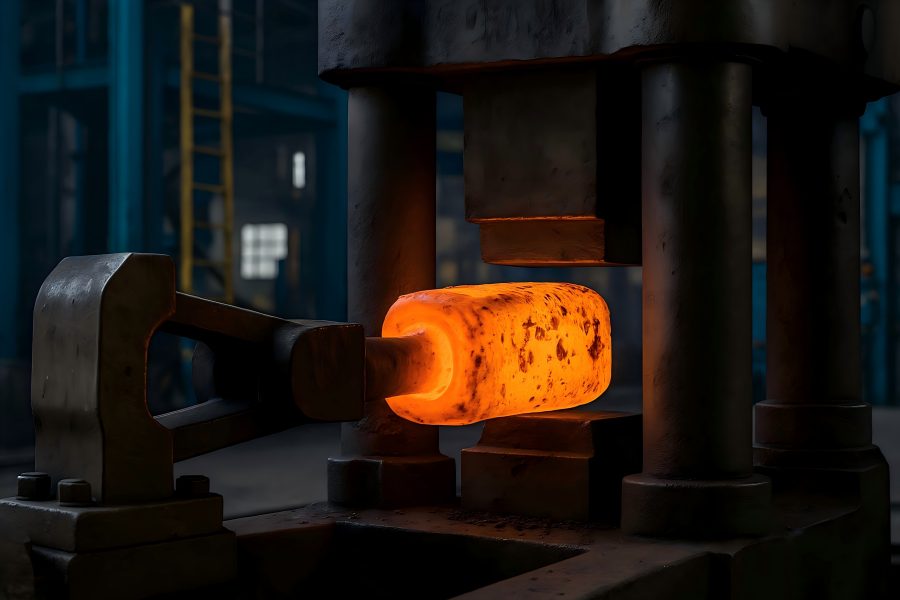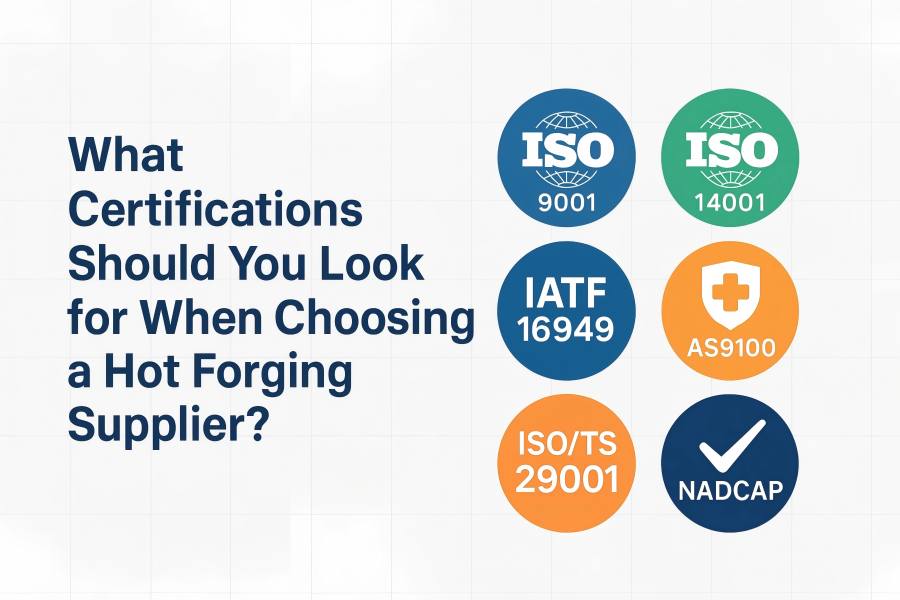Selecting the right hot forging supplier is more than just comparing quotes or evaluating equipment capabilities—it’s about ensuring long-term reliability, safety, and quality. Certifications serve as a verifiable indicator that a supplier adheres to globally recognized standards for production, materials, and management. These credentials are necessary for sectors including aerospace, automotive, defense, and energy.
Why Certifications Matter in Hot Forging
Hot forging involves heating metals—such as steel, aluminum, or titanium—to high temperatures before deforming them into precise shapes under immense pressure. This process improves mechanical properties like toughness, fatigue resistance, and structural integrity. However, the high temperatures and tight tolerances leave no room for error.
Certifications ensure that every step—from raw material procurement to final inspection—is performed under strict quality control and traceability systems. For customers, they guarantee consistency, compliance with industry regulations, and minimized risk of failure or rework. A certified supplier can also accelerate project approvals and reduce the need for repeated audits.
ISO 9001: The Foundation of Quality Management
ISO 9001 is the most fundamental certification for any manufacturing company. It demonstrates that the supplier maintains a systematic approach to quality management—covering documentation, training, customer feedback, and continuous improvement.
Why it matters in hot forging:
- Guarantees constant product quality across manufacturing cycles.
- Demonstrates control over nonconformities and corrective actions.
- Simplifies communication with customers and certifying bodies during audits.
- Encourages data-driven decision-making and customer satisfaction tracking.
Even though ISO 9001 doesn’t specify technical forging criteria, it provides the organizational backbone that supports all other specialized certifications.
ISO 14001
Hot forging consumes substantial energy and generates heat, emissions, and waste materials such as scale and lubricants. The worldwide environmental management standard ISO 14001 attests to the supplier’s proactive control of its environmental impact.
Key benefits:
- Compliance with local and international environmental regulations.
- Implementation of waste reduction, recycling, and emission control measures.
- Energy-efficient furnace and equipment management.
- Positive corporate image for sustainability-conscious customers.
For industries transitioning toward carbon-neutral supply chains, working with ISO 14001-certified suppliers can support broader ESG (Environmental, Social, and Governance) goals.
ISO 45001
Hot forging workshops are high-risk environments—exposing workers to extreme heat, heavy loads, and moving machinery. ISO 45001 certification demonstrates that the supplier has a proactive system for minimizing occupational hazards and maintaining worker safety.
Why this certification is critical:
- Confirms adherence to international safety standards.
- Reduces accident rates and downtime.
- Ensures compliance with labor regulations and insurer requirements.
- Improves morale and retention among skilled forging operators.
Clients benefit indirectly too—suppliers with safe and efficient workplaces tend to maintain higher productivity and lower operational disruptions.
IATF 16949
The International Automotive Task Force created IATF 16949 certification, which is required if you are purchasing forged components for automotive applications. It builds on ISO 9001 but adds stricter controls tailored to the automotive supply chain.
Key focus areas:
- Product traceability across the production cycle.
- Statistical process control and defect prevention.
- Continuous improvement and risk-based thinking.
- Requirements for customer-specific standards and audits.
Many car manufacturers will not approve a supplier without IATF 16949 certification, as it directly correlates to safety, durability, and performance of critical parts such as crankshafts, connecting rods, and gear blanks.
AS9100
For the aerospace sector, where a single defect can lead to catastrophic failure, AS9100 certification is indispensable. It expands on ISO 9001 by adding specifications unique to the aerospace industry for risk management, design control, and product traceability.
What AS9100 ensures:
- Strict control of raw materials (e.g., titanium, nickel alloys).
- Non-destructive testing (NDT) and metallurgical validation.
- Documentation traceable from billet to finished part.
- Compliance with regulatory authorities like FAA and EASA.
AS9100-certified hot forging suppliers are approved by top-tier aerospace OEMs and Tier 1 suppliers. This certification signals that the supplier’s processes meet the industry’s most demanding quality assurance systems.
ISO/TS 29001
For forged parts used in oilfield tools, drilling equipment, turbines, and pressure vessels, ISO/TS 29001 is the standard developed jointly by ISO and the petroleum industry (API).
Benefits include:
- Consistent control over material composition and mechanical properties.
- Documentation of forging and heat-treatment parameters.
- Prevention of material mix-ups and inclusion defects.
- Alignment with API standards such as API Q1 and API Spec 6A.
Choosing a supplier with ISO/TS 29001 helps energy companies ensure reliability in high-pressure, high-temperature environments where failures can have severe economic and safety consequences.
Nadcap Accreditation
Nadcap (National Aerospace and Defense Contractors Accreditation Program) is one of the most prestigious process-specific certifications. It’s required by major aerospace and defense OEMs (e.g., Boeing, Airbus, Lockheed Martin) for suppliers performing special processes such as heat treatment, NDT, or metallurgical testing.
Why Nadcap accreditation stands out:
- Independent verification of process control and equipment calibration.
- Detailed audit of forging, heat treatment, and inspection processes.
- Continuous surveillance audits to maintain certification validity.
- Global recognition across defense and aerospace supply chains.
A Nadcap-accredited hot forging supplier signals world-class process consistency and compliance with stringent aerospace specifications.
PED and AD 2000
For customers in the European Union, hot-forged components used in boilers, valves, or pipelines must comply with Pressure Equipment Directive (PED) 2014/68/EU. Suppliers can demonstrate this compliance through PED certification and often AD 2000-Merkblatt W0 for German markets.
PED/AD certifications verify:
- Material traceability and conformity assessment procedures.
- Control of mechanical and chemical testing.
- Qualification of personnel and welding/forging procedures.
- Documentation for CE marking.
Without these certifications, forged parts cannot legally be installed in EU pressure systems, making them essential for exporters to European markets.
ISO/IEC 17025
Beyond production, ISO/IEC 17025 accreditation ensures that a supplier’s laboratory testing—such as tensile strength, hardness, or microstructure analysis—is reliable and traceable to international standards.
Why it matters:
- Confirms technical competence of testing staff.
- Validates the accuracy of test results submitted with inspection reports.
- Reduces the need for third-party retesting.
- Supports full transparency in quality documentation.
For customers in industries requiring certified test data (aerospace, nuclear, oil & gas), ISO/IEC 17025 adds confidence that the reported material properties are authentic and repeatable.
ISO 50001
Forging is energy-intensive, relying heavily on furnaces, induction heating, and hydraulic presses. ISO 50001 certification demonstrates that the supplier systematically monitors and optimizes energy consumption.
Benefits include:
- Lower production costs and carbon footprint.
- Efficient use of furnaces and heat-recovery systems.
- Better alignment with sustainability goals of large OEMs.
- Contribution to customers’ ESG reporting requirements.
As more industries seek low-carbon supply chains, ISO 50001-certified suppliers stand out as partners for sustainable manufacturing.

Industry-Specific and Regional Certifications
Depending on your sector and region, additional certifications may be valuable:
- CQI-9 (Heat Treatment Assessment): Ensures consistent thermal processing for automotive applications.
- EN 9100 (European aerospace equivalent of AS9100): For suppliers in Europe.
- JIS Q 9100: For Japanese aerospace suppliers.
- API Monogram (American Petroleum Institute): For oil and gas equipment manufacturers.
- ISO 3834: For suppliers integrating forging with welding or assembly processes.
Each certification reinforces a supplier’s ability to meet specific customer or regional compliance expectations.
